Jenji Kohan’s GLOW may be one of the most underrated programs on Netflix. Partially, I think, because of its premise as a wrestling show, partially due to its neon-80’s pop aesthetic. But I love it. Much like Stranger Things, I’m not someone who’s watching this for the nostalgia. Hell, I’m still pretty casual in my following of wrestling. But you don’t need either of those to enjoy GLOW, and Season One proved that they could milk a good story out of a silly sounding premise. And Season Two doubles down.
Unfettered by a need to justify itself as a wrestling show, and with the rules of wrestling explained well enough, GLOW spent its second season transitioning into a fantastic little ensemble comedy/drama. It was touching, funny, and a little bit weird in the best possible way. While some of the running plots are a little mishandled, and some of the characters still erratic, altogether GLOW accomplished something few Netflix shows have done: surpassed itself.
Let me tell ya something, brother. If you haven’t seen GLOW Season 2 yet, well then you’d best head back to where you came from, ya jabroni, because there’s going to be spoilers.
The Good
There’s a lot of really good stuff happening in GLOW, and honestly, I don’t think I can hit them all. But these are the high points that really stuck out this season.
Workplace Comedy
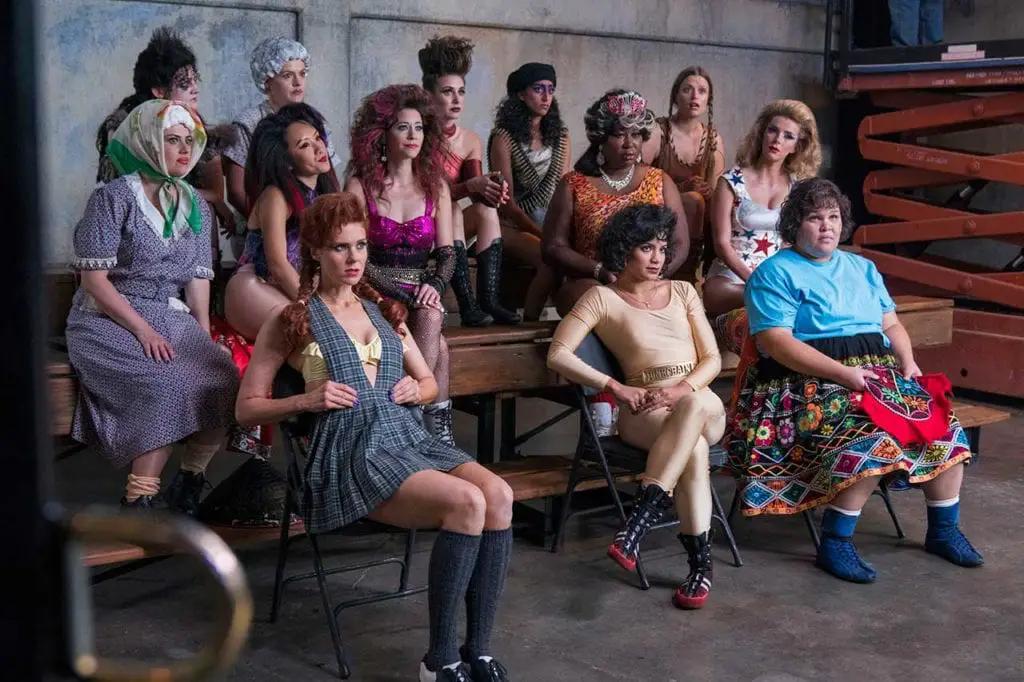
A workplace wrestling comedy. How has this not happened before? While the first season drew a lot of laughs in outlandish characters and the silliness of wrestling (something this season still relies on), it still had the sort of big “let’s put on a show” feel that works well in movies but can run out of steam in a prolonged format. Season Two, by comparison, lets the show breathe as it becomes more about the trials and tribulations of a struggling company. Think of the first season as The Muppet Movie and the second as The Muppet Show. The characters get to bounce off of one another, Murphy’s law happens frequently, and there’s more time doing what Jenji Kohan shows do best: make you cry when you least expect it. Speaking of…
Mother of All Matches
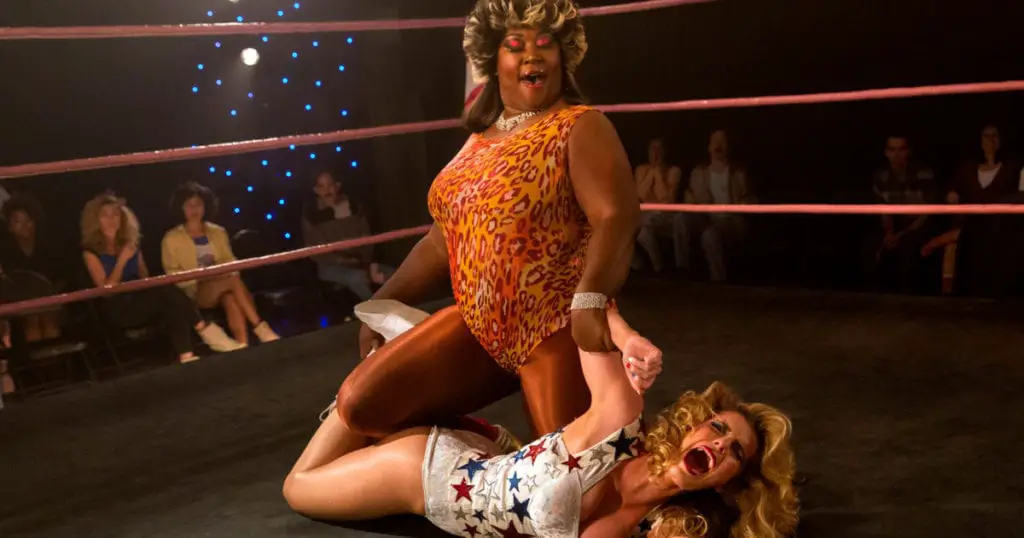
The whole of Season One, Welfare Queen stood out as one of those “man things were racist back in the day” jokes throwback shows love to use. However, in this episode, we finally got to see the actual effect those stereotypes can have on people. Tammé is a hard worker who puts her family first, yet is mocked in-ring as a lazy moocher. Her foil is an All-American face the crowd knows is a good mother even as Debbie sells most of her furniture and barely sees her own son.
Bettie Gilpin does a good job in this episode as her character slowly breaks down, and you really feel for her in her crisis as a mother. But this is Kia Stevens’s episode. Many critics were shocked that Stevens, the former dominant monster heel Awesome Kong in TNA and Kharma in WWE, could play a character so well in the last season. But I think she ought to get an Emmy for this episode. She’s giddy, proud, nervous, caring. The pain she’s hiding is clear throughout the episode. When it finally bubbles up at the end of the match, the air is sucked out of the room. The transition from goofy clown Welfare Queen to heartbroken mother Tammé is seamless and incredibly powerful. In an ensemble filled with talented and often more experienced actresses, Stevens may have done the best acting all season.
It’s Gay, Fam
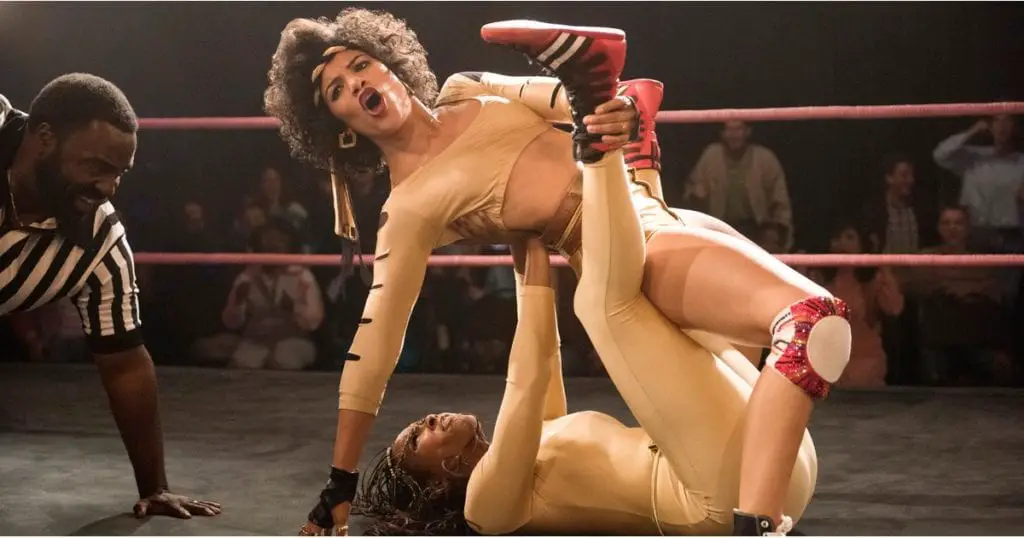
You can’t show wrestling, of either gender, to the uninitiated without the inevitable comments on the…subtext behind all the gropes and grabbing done in spandex. GLOW has avoided these jokes, thank goodness, but did finally add an LGBT character to the cast this season. Yolanda, the new Junkchain aka “Cholo Junkchain” just starts out as an unwelcome ex-stripper replacing Cherry. But she turns out to be an intelligent and well-adjusted young woman with almost none of the hang-ups of most of the other GLOW girls. Oh, and she’s super, DUPER gay. It’s never fetishized or mocked, however, and is as much a part of her character as Melrose’s obsession with her GLOW-induced dry spell. Not only that, but Yolanda plays a large part in helping Arthie (Beirut the Mad Bomber) learn to make herself happy for once. The two grow close, have an adorable dance sequence (with Yolanda in a tux), and are heavily implied to be together by the end of the season. LET THEM KISS YOU COWARDS
Screw Your Nostalgia
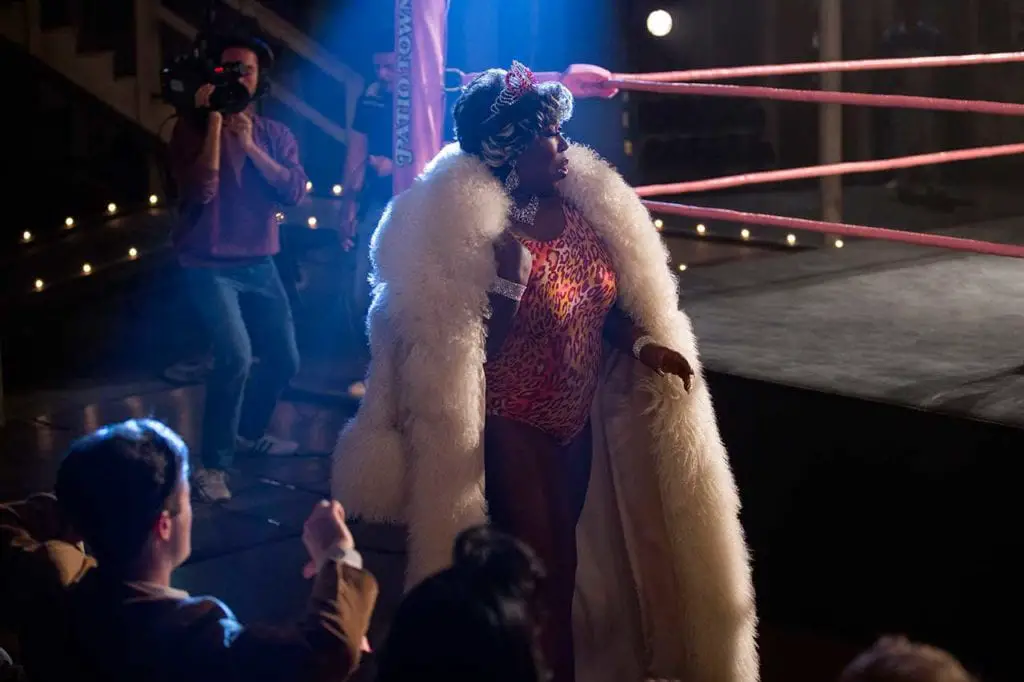
Dude, the 80’s fucking sucked. Reagan was in charge, the American welfare state was getting cut, and people were dying of AIDS. The 80’s gave us Trump for god’s sake. People were racist, drugged up, and just as dumb as ever. And thank god GLOW knows that.
GLOW could have easily banked on its settings for a cheap nostalgia pop, showing off the neon colors and weird mustaches of days gone by. It could emulate the Steven Spielberg and John Hughes movies that Stranger Things mines to tickle the brains of Gen-X viewers and their kids. But GLOW exists beneath the synth-pop and pink flamingos. It has creepy producers raping talent in exchange for promotion, racist caricatures, an unforgiving immigration system, and suburban lives that break down at the drop of a hat. While it does venture into the nostalgia here and there, its usually in the context of the in-universe show, such as when they film the opening in the candy-coated corridors of the local mall. It’s just incredibly refreshing to see a show that looks back and rubs a little mud on the rose-colored glasses.
The Bad
Ruth Fades
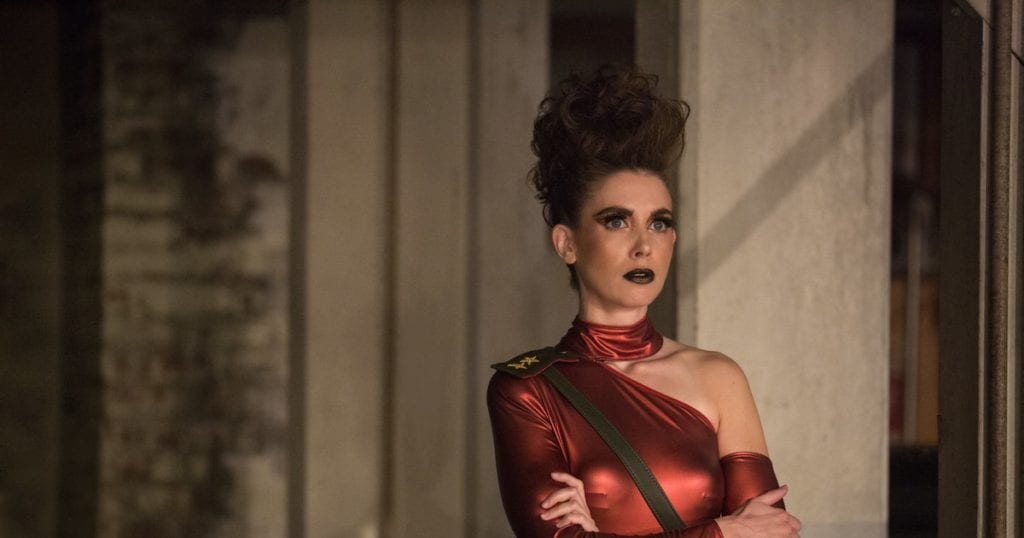
Ruth in Season One came close to being a re-hash of Piper Chapman: a bland, fairly unlikable white girl to bounce the more interesting side characters off of. But thanks to Alison Brie’s sheer earnestness, the real heart of Ruth came out at the end. Defined by trying to get out of ex-friend Debbie’s shadow, Ruth finally seemed to be looking ahead at the finish of Season One. But then the show just kind of…forgot her.
That’s not to say that Ruth isn’t around. She’s still the viewpoint character, the eyes and ears of the viewer for many of the goings on in and around the GLOW production. But the show doesn’t have a whole lot for her this season other than constant, heartbreaking punishment. They took a person who was in some ways the heart of GLOW and broke her ankle, doubled down on the negging from Sam, and even put her in a position to get raped. And as it does so, it doesn’t quite put in the emotional work that all of that piling up would necessitate. To boot, they’ve tried to complicate the surrogate daughter dynamic she has with Sam by having him maybe, sort of fall for her? And she might, kinda reciprocate? I don’t really know what’s up with that, but it’s REALLY creepy and comes way too soon after Ruth escapes a sexual assault. While she eventually is made a co-director and earns some respect, it’s after she’s gone through a trauma conga line and been pushed aside to act as a punching bag for Debbie’s divorce angst. Which…
Boo Freakin’ Hoo
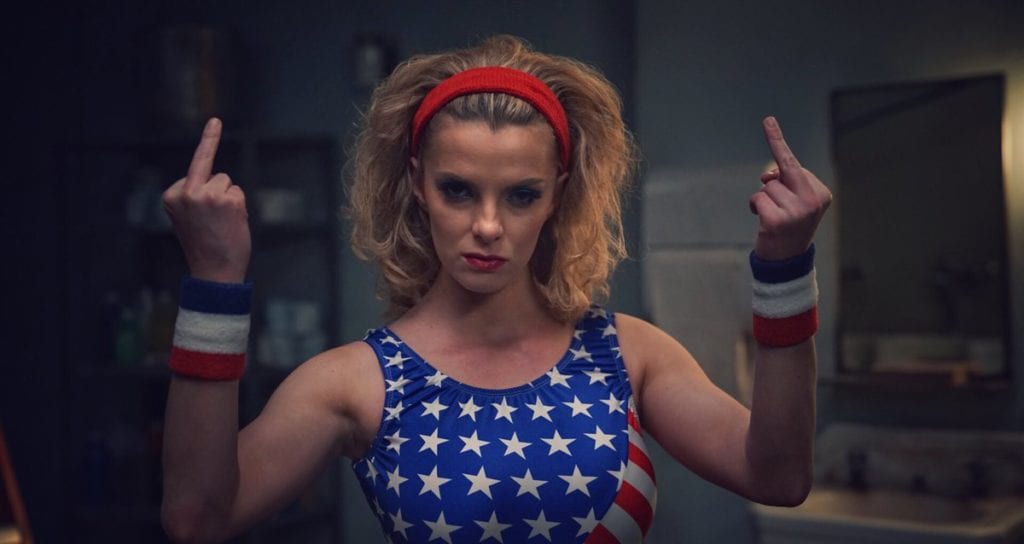
It’s a testament to the quality of GLOW’s storytelling that it can fumble its two ostensible leads this season and still come out stronger. Debbie’s divorce narrative is probably the biggest side-plot in the show. Every episode she’s dealing with her kid, her asshole husband, her asshole husband’s mistress, proving herself as a mother, as a woman, as a producer. But she’s never as consistent a character as in Season One, where her animosity towards Ruth is understandable even as it gets more and more overblown. Sometimes she’s conniving, getting a good deal and a producer gig out of her contract over the heads of the other woman. Sometimes she’s pitiful, a victim of sexism at the hands of Sam or her husband. And sometimes she’s a caring mother, sometimes she’s not. She does coke, once. She breaks Ruth’s ankle and knocks a big part of the show out. And never once is Debbie treated as anything but sympathetic.
Even when she lashes out, at Ruth or her husband (but it’s usually Ruth), the show seems to go out of its way to cushion it by showing us just how much Debbie is trying and how much pain she’s in. The only time that she comes close to being wrong, her badgering Ruth for not getting raped, she’s easily forgiven within a couple episode and STILL manages to pin some guilt on Ruth. Debbie is pretty close to an antagonist in this piece, but the show refuses to acknowledge it.
Wait, Who Has AIDS?
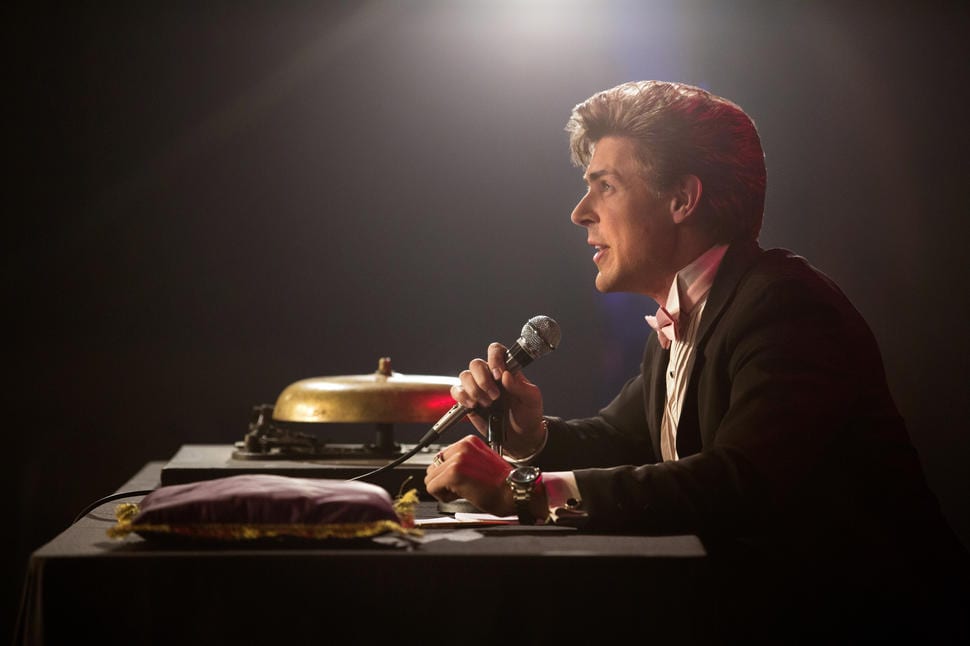
Remember what I said up there about handling the dark side of the 80’s? GLOW does a pretty good job of that, but there was a big ol’ blind spot this season: the AIDS crisis. To start, props to the show for even discussing it. While it would have been ahistorical to ignore the subject on a show set in California, they could have easily avoided a very difficult topic, the visibility of which remains a raw nerve in the gay community. But the way they did handle it was…strange.
First of all, the person who dies of AIDS was a fairly inconsequential character, Bash’s butler Florian. In Season One, the show danced around the sexuality of both these men. Were these two well-dressed bachelors secretly an item, or just very good friends? Is Bash interested in wrestling as an outlet for his repressed sexuality? Who knows! Because they shipped Florian right out of the door after the first season and he’s never heard from again. Except when he dies. Of AIDS. And yes, he was gay. Our only real confirmation of this comes from a visit by Bash, Carmen, and Rhonda to an incredibly stereotypical gay club that Florian frequented. We never see him on screen, just Bash’s reaction to his friend’s death and the hamfisted way everyone from the crematorium to the house cleaners allude to the disease as obtusely as possible. Yet the actual victim, the gay character afflicted by this horrifying illness, is neither seen nor heard from all season. And unlike the sexism or racism discussed this season, the show chooses to hide the real victims of AIDS, even as it moralizes about the tragedy of their plight.
Conclusion
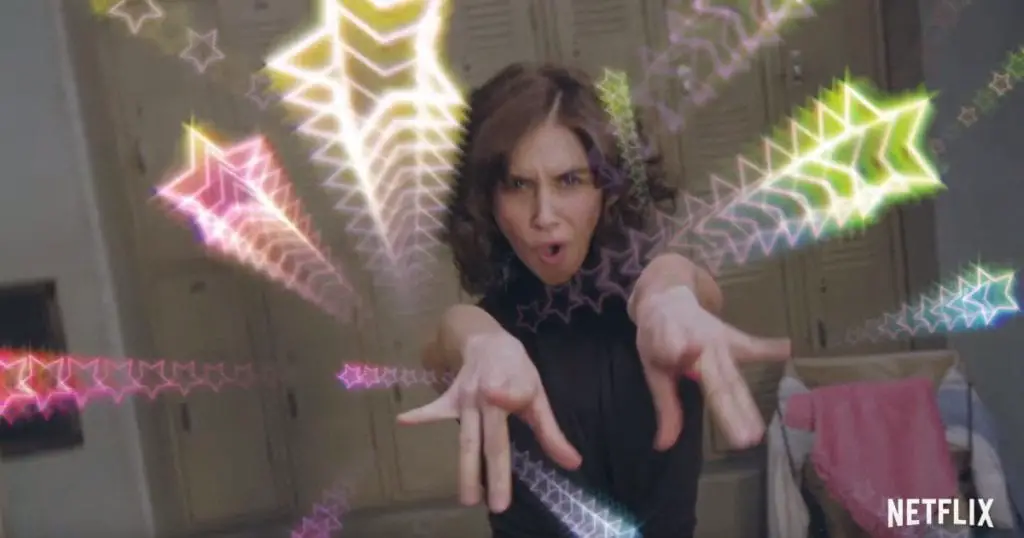
Much like Orange Is The New Black, GLOW is rapidly transitioning out of a drama centered on two core characters into a broad ensemble held up by a whole stable of talented women who balance the comedy and drama that feel so close to real life. But even as the ensemble takes shape, the show shouldn’t just let its leads melt away with nonexistent stories and inconsistent characterization (they can save that for real wrestling). There’s not been too much info released on if Season 3 is happening, but if it does, it’s going to be big. Nothing says excess like Las Vegas in the 1980’s, and I can’t wait for a chance to see the Gorgeous Ladies Of Wrestling take on Sin City.

